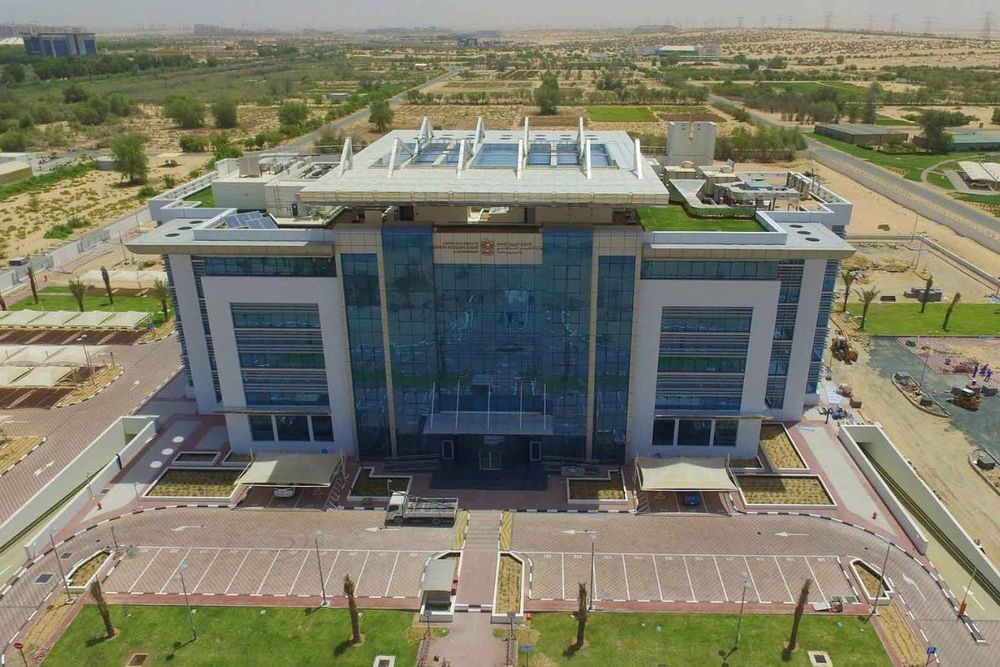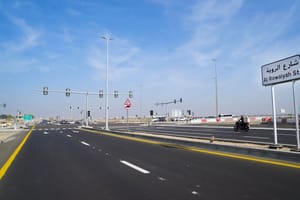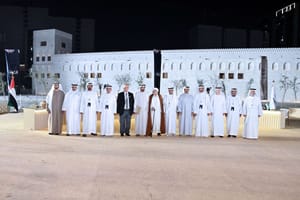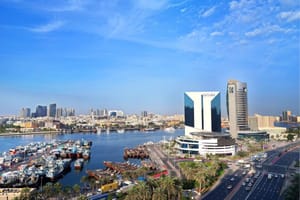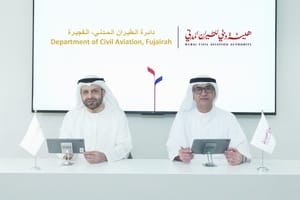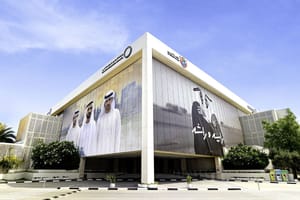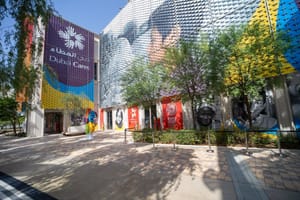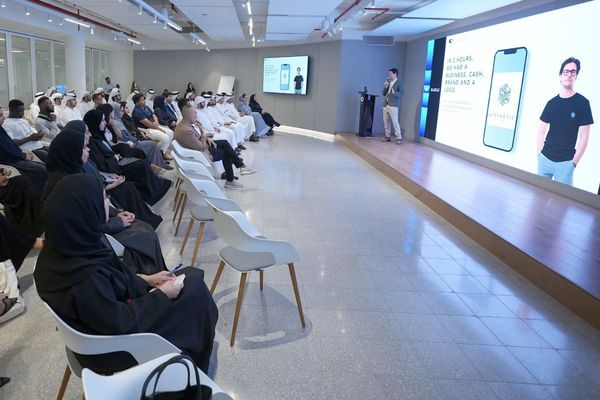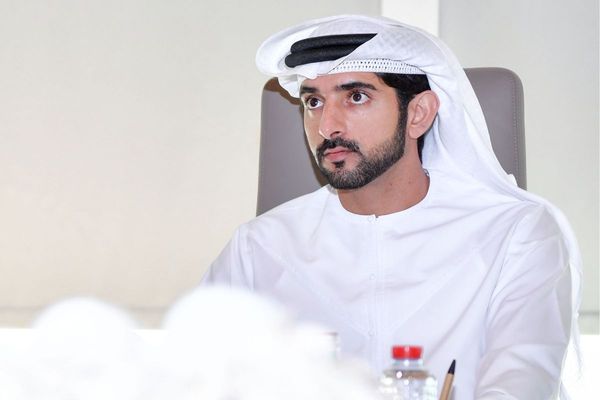The Ministry of Climate Change and the Environment held the third session of the “National Dialogue for Food Security” under the theme “Transitioning to Sustainable Food Consumption Patterns”.
The event covered the challenges and opportunities in enhancing food security in the UAE by facilitating constructive dialogue and discussion between stakeholders, covering both public and private sectors, to achieve inclusive, equitable and sustainable food systems and consumption patterns.
In a collaborative effort with the United Arab Emirates University (UAEU) and HealthyPath, a consultancy with expertise in food sustainability and nutrition policies, the event took place in the SEE Institute building.
This facility, which is dedicated to sustainability research and education, is situated within the Sustainable City in Dubai. Remarkably, it is the first building globally to achieve net-zero carbon emissions. Covering a span of 50,000 square feet, the building is the home for the SEE Institute, a subsidiary of Diamond Developers specialising in research, development, and training.
The event was attended by Mariam bint Mohammed Almheiri, Minister of Climate Change and the Environment; Mohammad Saeed Al Nuaimi, Acting Under-Secretary of the Ministry; and Mohammed Mousa Alameeri, Assistant Under-Secretary of the Food Diversity Sector at the Ministry, as well as a number of representatives from government and private organisations, academic and social institutions, industrial associations, youth groups, civil society, national and private sector farms.
During her speech, Almheiri said,
“The upcoming UN Climate Change Conference (COP28), which will be held in the UAE this November, is a pivotal moment for the future of the planet, as it provides a historic opportunity for world leaders to share knowledge and collaborate to combat climate change. This year, food security and the pathways to more sustainable food consumption will be among the key topics of discussion, as climate change is closely linked to food security, affecting food availability, accessibility, and stability.”
She added,
“The food industry, intertwined with various activities like agriculture, transportation, storage, and the entire food value chain, can significantly contribute to environmental preservation. However, the challenges of desertification and water scarcity due to climate change profoundly affect this sector, resulting in a decline in agricultural and food production. To maintain equilibrium, we must embrace a more sustainable approach in managing the food sector and reduce its emissions, which stand as the world's second-largest emission source. It is also imperative that we transform our food systems to be more sustainable by prudently managing our food consumption, safeguarding our livestock, bolstering biodiversity, minimising food waste, and diversifying our food sources.”
“The National Dialogue for Food Security represents an opportunity for all of us, as partners, to create a comprehensive vision for enhancing our national food security, considering our food needs, and adopting more sustainable and climate-smart technologies and systems. By achieving our food objectives and contributing to global efforts to address climate change by reducing carbon emissions from the food and agriculture sector, we have a great opportunity to create an experience from which the world can benefit and build a sustainable, secure, and hunger-free future,”
Almheiri explained.
Mohammed Mousa Alameeri emphasised the importance of the National Dialogue for Food Security, which reflects the ministry's efforts and role in leading national endeavours in preparation for hosting COP28 in November and highlighting the latest developments and efforts to enhance food security in a sustainable and environmentally friendly manner.
He said,
“The third dialogue on food security focused on transitioning to sustainable food consumption patterns and explored future solutions for changing consumption patterns. We are committed to developing strategies, policies, and plans to create a more balanced and sustainable food system and consumption patterns. We strive to make this dialogue a catalyst for measurable solutions and actions that reflect the aspirations of the UAE to top the Global Food Security Index by 2051. Food consumption and production significantly impact environmental sustainability, and there is a need to shift populations towards consumption patterns that rely on alternative protein sources and more local products.”
“Researching food consumption patterns, behaviour, and the environmental footprint of the UAE's food system is a key empowering factor for us to design future policies and programmes. Food manufacturers are responsible for shifting towards healthier and more sustainable choices and accelerating awareness and education regarding nutrition to promote the acceptance of healthy and sustainable food products,”
Alameeri added.
The Chairman of the SEE Institute Engineer Fares Saeed stated,
“At the SEE Institute, we aim to accelerate and intensify climate action through education, research and development, organising specialised events and conferences that empower our partners to reach a future of neutral emissions. Food security is a forefront topic we strive to intensify the dialogue around to ensure a sustainable future.”
He added,
“By hosting the third National Dialogue on Food Security, organised by the Ministry of Climate Change and Environment at the SEE Institute, we hope to contribute to providing an effective platform for knowledge exchange, sharing experiences and best practices among all stakeholders to ensure the best solutions to enhance national food security. We aim to present an inspiring model of our experience in the Sustainable City - Dubai, which has worked on bridging the food gap, relying on indoor and vertical farming solutions, promoting urban farming, and combating food waste. This has enabled us to produce a significant portion of vegetables and fruits and achieve self-sufficiency in growing leafy produce needed by the residents of the Sustainable City.”
In a joint statement, the United Arab Emirates University and HealthyPath affirmed that the shift towards sustainable and healthy food consumption patterns represents a significant opportunity to mitigate and adapt to climate change in the UAE while promoting public health at the same time.
The statement pointed out that addressing food consumption is a viable way to make substantial progress, and it is vital to highlight this issue during the COP28 conference events and enrich the discussion on managing demand systems and its significant impact on the supply side.
According to the statement, both parties emphasised the need to enhance collaborative efforts across the entire food value chain, starting with farmers and promoting sustainable practices in producing fresh products. Moreover, enabling food manufacturers to innovate in the field of nutritious foods and alternative protein sources is of utmost importance. Retailers also play a pivotal role in ensuring that healthy and sustainable food choices remain affordable and easily accessible. The statement highlighted the need for research institutions to provide vital data and research to guide evidence-based policymaking, while governments should establish the necessary frameworks and policies to facilitate a successful transition.
HealthyPath and the UAEU have sought to include this topic in the agenda of the COP28 conference, involving key stakeholders from the governmental and private sectors, research institutions, civil society groups, and youth. By adopting this approach, we aim to identify the fundamental requirements for transitioning towards sustainable and healthy food consumption patterns. In addition, we recognise the importance of research in guiding evidence-based policies, the need for national reference data, and the crucial role of education in achieving widespread adoption of healthy and sustainable food systems.
Several dialogue sessions were held during the Third National Dialogue for Food Security, including Sustainable Food Consumption Patterns - An Integral Pillar of Food Security and Policy, Innovation and Education Opportunities for Sustainable Healthy Food. The event also discussed Prerequisites and Necessary Policies for Transitioning to Sustainable Healthy Food Systems; Sustainable Food Systems in the Context of the UAE: Challenges and Opportunities; Unlocking the Potential of Food Innovation; Food-Tech Innovation and the Importance of Cross-Knowledge Sharing; Revamping Our Food Ecosystem; Ne'ma Initiative: An Example of an Intersectoral Collaboration' and Transitioning to Sustainable Food Consumption Patterns.
Additionally, the third session focused on Youth’s Role in Food Sustainability and included a Youth Circle and a Collaborative Innovation Workshop.
News Source: Emirates News Agency
